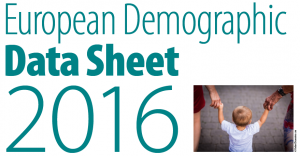The article “Country-Specific Conditions for Work and Family Reconciliation: An Attempt at Quantification” by Anna Matysiak and has been nominated by Springer Nature as one of the groundbreaking articles that could help change the world. Read more
Home >> News
News
Tomáš Sobotka awarded with the Allianz European Demographer Award 2017
On 15 February Tomáš Sobotka received the Allianz European Demographer Award 2017, alongside with Felix Tropf from the University of Oxford. The award was presented at the 6th Berlin Demography Forum (BDF). T. Sobotka received the award for his research on fertility, childlessness, assisted reproduction and European population trends. Further details are provided at Population Europe website.
Human Fertility Database Research Reports launched
To promote empirical and methodological research based on population-level fertility data, a new series of research papers, the Human Fertility Database Research Reports (HFD RR) was launched in December 2016.
The series is named after the Human Fertility Database as the central resource of detailed and high quality data on period as well as cohort fertility. The HFD Research Reports are published jointly with the Max Planck Institute for Demographic Research and the Vienna Institute of Demography as MPIDR or VID Working Papers.
As of 15 January 2017 the first three HFD RRs have been published, of which two are based on the EURREP research. The reports can be accessed here: http://www.humanfertility.org/cgi-bin/reports.php
EURREP career advancements!
Anna Matysiak received Habilitation and Zuzanna Brzozowska defended her PhD thesis. Congratulations!
EURREP Research Brief No. 3
The third issue of the EURREP Research Brief featuring childlessness trends in Europe is put out. You can read it here.
Tomáš Sobotka at the anniversary symposium of the Population Research Institute in Finland
On 14 September 2016 Tomáš Sobotka gave an invited talk on “Ever shrinking families? Economic recession, family change and fertility in Europe” at the symposium organized to celebrate 70th anniversary of the Population Research Institute (Väestöntutkimuslaitos) in Helsinki, Finland.
The video of the talk can be watched here and the presentation slides can be accessed here.
EURREP at the 2nd Human Fertility Database Symposium
The EURREP team will present their macro-level research at the 2nd Human Fertility Database Symposium in Berlin, 23-24 June 2016.
Thursday, June 23th
- 2:00–3:50 PM, Session I: Fertility Change and Variation: Cross-national and Cross-regional Perspective
Decomposing cohort fertility decline in low fertility countries: The role of parity progression ratios · Kryštof Zeman, Éva Beaujouan, Zuzanna Brzozowska and Tomáš Sobotka
- 4:10-6 PM, Session II:Determinants of fertility change and variation: gender roles, economic uncertainty, marriage
Will one replace two? Trends in parity distribution across education in Europe · Zuzanna Brzozowska, Éva Beaujouan and Kryštof Zeman
- 9:00-10:30 AM, Session III:Cohort perspective on fertility and childlessness
Childlessness in Europe: review of data and long-term trends among women born in 1900-1972 · Tomáš Sobotka
EURREP at the European Population Conference, 31 August – 3 September, Mainz
Different strands of the EURREP research will be well represented at the upcoming European Population Conference
Thursday, September 1
- Session 6. Fertility Preferences 1: When a poor index becomes a good proxy: on the predictive value of individual fertility preferences at the cohort macro-level • Eva Beaujouan, Wittgenstein Centre (IIASA, VID/ÖAW, WU); Laurent Toulemon, Institut National d’Études Démographiques (INED).
- Session 14. Family transitions, employment and earnings: Education and diverging family trajectories in Britain: new insights from microsimulation • Maria Winkler-Dworak, Wittgenstein Centre (IIASA, VID/ÖAW, WU); Eva Beaujouan, Wittgenstein Centre (IIASA, VID/ÖAW, WU); Ann M. Berrington, University of Southampton; Martin Spielauer, Statistics Canada.
- Session 22. Measuring fertility: Twin peaks: the emergence of bimodal fertility profiles in Latin America • Everton E. C. Lima, Universidade Estadual de Campinas (UNICAMP); Kryštof Zeman, Wittgenstein Centre (IIASA, VID/ÖAW, WU) and Vienna Institute of Demography; Ruben Castro, Universidad Diego Portales; Mathias Nathan, Universidad de la República, Uruguay; Tomas Sobotka, Vienna Institute of Demography.
- Session 43. Gender and fertility: Gender revolution, family reversals and fertility • Tomas Sobotka, Vienna Institute of Demography; Anna Matysiak, Wittgenstein Centre (IIASA, VID/ÖAW, WU) and Warsaw School of Economics; Zuzanna Brzozowska, Vienna Institute of Demography and Warsaw School of Economics.
Friday, September 2
- Session 58. Modelling fertility: Estimating indicators of fertility timing from consecutive census data on children ever born • Kryštof Zeman, Wittgenstein Centre (IIASA, VID/ÖAW, WU) and Vienna Institute of Demography.
- Session 67. Education and fertility 2: Educational pairings and fertility across Europe: how do the low educated fare? • Natalie Nitsche, Vienna Institute of Demography; Anna Matysiak, Wittgenstein Centre (IIASA, VID/ÖAW, WU) and Warsaw School of Economics; Jan Van Bavel, Katholieke Universiteit Leuven; Daniele Vignoli, Università di Firenze.
- Session 80. Happiness and childbearing: Work-family conflict moderates the impact of childbearing on subjective well-being • Letizia Mencarini, Università Bocconi; Anna Matysiak, Wittgenstein Centre (IIASA, VID/ÖAW, WU) and Warsaw School of Economics; Daniele Vignoli, Università di Firenze.
- Session 94. Education and fertility 3: Will one replace two? Trends in parity distribution across education in Europe • Zuzanna Brzozowska, Vienna Institute of Demography and Warsaw School of Economics; Eva Beaujouan, Wittgenstein Centre (IIASA, VID/ÖAW, WU); Kryštof Zeman, Wittgenstein Centre (IIASA, VID/ÖAW, WU) and Vienna Institute of Demography.
- P2. Poster Session 2: Ultra-low fertility in Korea: the role of tempo effect • Sam Hyun Yoo, Wittgenstein Centre (IIASA, VID/ÖAW, WU) and International Institute for Applied Systems Analysis (IIASA); Tomas Sobotka, Vienna Institute of Demography.
Saturday, September 3
- Session 102. Marriage and repartnering: Falling first marriage rates in Europe during the Great Recession. A comparison of 17 countries • Caroline Berghammer, Wittgenstein Centre (IIASA, VID/ÖAW, WU) and Universität Wien; Tomas Sobotka, Vienna Institute of Demography.
The European Demographic Data Sheet 2016 is available
 The 2016 European Demographic Data Sheet is now available as a printed and pdf-poster and as a website. Through a combination of data for all countries of Europe and for broader European regions, maps, tables and graphs, the datasheet provides an in-depth look at European demography. The online version available at populationeurope.org provides expanded coverage, including additional maps, ranking charts as well as details about data sources and definitions. It also allows the users to download all the data. The datasheet was prepared researchers affiliated with the Wittgenstein Centre for Demography and Global Human Capital.
The 2016 European Demographic Data Sheet is now available as a printed and pdf-poster and as a website. Through a combination of data for all countries of Europe and for broader European regions, maps, tables and graphs, the datasheet provides an in-depth look at European demography. The online version available at populationeurope.org provides expanded coverage, including additional maps, ranking charts as well as details about data sources and definitions. It also allows the users to download all the data. The datasheet was prepared researchers affiliated with the Wittgenstein Centre for Demography and Global Human Capital.
EURREP at the 2016 Annual Meeting of the Population Association of America (PAA), 30 March – 2 April 2016
Different strands of the EURREP research will be well represented at the upcoming PAA Annual Meeting
Thursday March 31th
- 2:45 PM – 4:15 PM: Session 61: Childlessness, Location: Washington Marriott Wardman Park DELAWARE A
Paper 1: Childlessness Trends in Twentieth-Century Europe: Limited Link to Growing Educational Attainment · Eva Beaujouan, Zuzanna Brzozowska and Kryštof Zeman
Friday April 1st
- 08:15 AM – 09:45 AM: Session P6: Fertility, Family Planning, Sexual Behavior, and Reproductive Health 2, Location: Washington Marriott Wardman Park EXHIBIT HALL A.
Poster 32: Changing partnership and fertility · Eva Beaujouan, Maria Winkler-Dworak, Paola Di Giulio, Martin Spielauer
- 08:15 AM – 09:45: Session P6: Fertility, Family Planning, Sexual Behavior, and Reproductive Health 2, Location: Washington Marriott Wardman Park EXHIBIT HALL A.
Poster 29: The Impact of the Great Recession on Age-Specific Fertility in Europe · Anna Matysiak, Tomas Sobotka and Daniele Vignoli
- 08:15 AM – 09:45: Session P6: Fertility, Family Planning, Sexual Behavior, and Reproductive Health 2, Location: Washington Marriott Wardman Park EXHIBIT HALL A.
Poster 34: The Role of Tempo Effect in the Ultra-Low Fertility in South Korea · Sam Hyun Yoo and Tomas Sobotka
- 01:40 PM – 02:00 PM: Session 147-3: Low Fertility, Location: Washington Marriott Wardman Park WASHINGTON ROOM 4
Presentation: The Low–Fertility Future? Projections Based on Different Methods Suggest Long-Term Persistence of Low Fertility · Tomas Sobotka, Kryštof Zeman and Stuart Gietel-Basten


